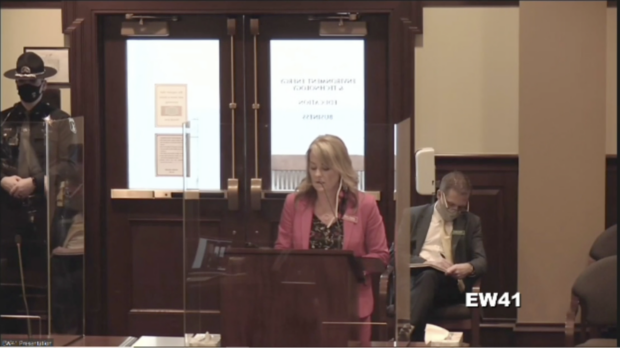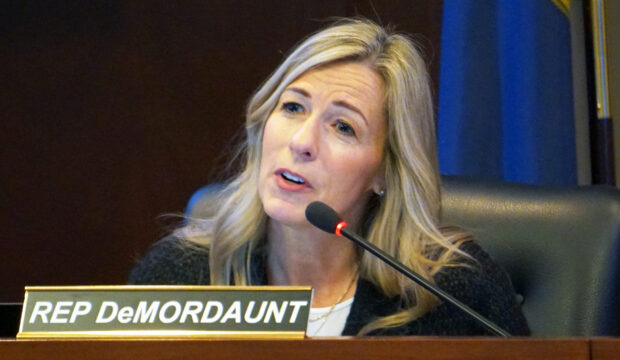
The House Education Committee unanimously killed schools chief Sherri Ybarra’s in-person learning bill Monday, dealing a setback to one of her biggest proposals of the year.
Ybarra has been promoting the bill for weeks.
And she ratcheted up the stakes during Monday’s introductory hearing.
“This is possibly the most important piece of legislation that I have brought forward to you,” Ybarra told the committee.
Ybarra, who attended the hearing in person, said the heart of her bill was about providing students access to in-person instruction where safety requirements can be developed at the local level.
“The overwhelming guidance has been that whenever and wherever possible our students should be in the classroom with their teachers, support staff and their peers,” Ybarra said.
Although introductory hearings such as Monday’s are often formalities or routine matters that pave the way for a full public hearing at a later date, legislators immediately set upon Ybarra with questions.
For several legislators, the opposition had more to do with how the bill was organized and written than a philosophical disagreement. This is the same committee that has complained about school closures and virtual learning.
Legislators from both political parties asked why Ybarra defined “virtual learning” but then didn’t appear to address virtual learning in the bill.
Other legislators asked about the safety requirements Ybarra mentioned in the bill, and how those would work.
One legislator attempted to amend Ybarra’s bill as it was up for introduction, a sometimes dicey process that didn’t work out Monday.
“We ought to try and do the cleanest language possible,” said Rep. Gary Marshall, R-Idaho Falls. “I get a little concerned that we promote legislation that is confusing. It ought to be crisp, it ought to be clean.”
Rep. Judy Boyle, R-Midvale, led the push to kill the bill, so it could be rewritten rather than “us picking a (draft bill) to death and amending and re-amending” it.
House Education Committee Chairman Lance Clow, R-Twin Falls, compared Monday’s hearing to making sausage.
Even before Ybarra brought it to the Legislature, the bill attracted opposition from a group of Idaho superintendents. The district leaders worried the bill’s definition of an emergency could force schools to provide in-person instruction during dangerous situations and take away local decision-making.
“This proposal usurps the control of locally elected school boards to respond nimbly to emergencies, ties the hands of our hardworking educators and limits options for our students,” the Region III School Superintendents’ Association wrote last month.
Although that version of the bill is dead, it doesn’t mean the issue is dead for the year. Legislators encouraged Ybarra to rewrite the bill, clean it up and bring an improved version forward.
This is the latest example of Ybarra struggling to gain a foothold with the Legislature.
For years, the Legislature rejected her proposed rural schools center, also one of her top priorities.
In 2020, legislators used the budget process to transfer 18 employees and $2.7 million from Ybarra’s State Department of Education to the State Board of Education. Ybarra filed suit and challenged the transfer, but she lost her case in the Idaho Supreme Court and the transfer went ahead as legislators planned.
Limiting school closure authority
In other action from a busy Monday, House Education advanced two bills to limit who has the authority to close schools due to a pandemic or contagious disease.

The first, House Bill 67, would take away public health districts’ ability to close a school or program. Under the bill, that authority would rest only with the governor, State Board of Education, a locally elected school board or a charter school board of directors (which is not elected).
“It respects local control,” sponsoring Rep. Gayann DeMordaunt, R-Eagle, said. “It clearly delineates who closes schools and who keeps those doors open and empowers boards who are duly elected by parents and the electorate.”
The bill also states that if a school board reopens a school without requiring safety measures then that action to reopen would not violate a public health order or city order.
The closure authority debate has been a top issue for some House Republicans since the summer, when they tried unsuccessfully to get Gov. Brad Little to take the matter up during the August special session.
House Bill 67 passed over the opposition of Rep. John McCrostie, D-Garden City, and Steve Berch, D-Boise. It heads to the House floor for consideration.
Finally, House Education advanced a similar bill dealing with community colleges. House Bill 68 specifies only a community college’s board of trustees would be able to close a college or any of its buildings or campuses.
That bill passed comfortably on the strength of Republican support. Rep. Sally Toone, D-Gooding, joined McCrostie and Berch in opposing it.
Virtual charter funding
Budget-writers will take a run at providing $7.6 million for two virtual charter schools that absorbed an enrollment surge during the pandemic.
“We do recognize that there’s a situation here,” said Sen. Jim Woodward, R-Sagle, spelling out the funding plan during Monday’s Senate Education Committee meeting.
The Joint Finance-Appropriations Committee will draw up a spending bill to provide extra funding for the Idaho Virtual Academy and Inspire Connections, said Woodward, who sits on both Senate Education and JFAC.
As brick-and-mortar public schools closed last spring, during the onset of the coronavirus pandemic, hundreds of parents opted to move their kids into the virtual charters. Idaho Virtual Academy, for example, added nearly 2,000 students this fall, and hired more than 70 full-time staffers to handle this doubling in enrollment.
Normally, schools receive an increase in state funding when student numbers surge. But all charter schools operate under a growth cap, designed to head off a large, sudden increase in annual state funding.
A House-passed bill would eliminate this charter funding gap. But Senate Education members said they wanted to keep the cap in place — and on Monday, the committee voted to hold this bill.
It isn’t clear whether the $7.6 million would come from state funding, budget reserves or federal dollars. That question hasn’t been resolved, Woodward told Idaho Education News Monday evening.
‘Work force ready’ diploma
A unanimous Senate passed a bill Monday that would allow high schools to offer a new “work force ready” diploma.
Senate Bill 1039 would encourage students to pursue a career-technical course path — allowing them to use practical math as a senior-year math course, or technical writing as a senior English course. The idea is to make sure high school students know all the options before them, said Senate Education Committee Chairman Steven Thayn, R-Emmett, the bill’s sponsor.
In all, 97 percent of graduates with a career-technical emphasis go on to college, land a job or go into the military, Thayn said during brief floor debate Monday.
With the 33-0 Senate vote, the bill now goes to the House.
Disclosure: Idaho Education News covered Monday’s hearings remotely.
